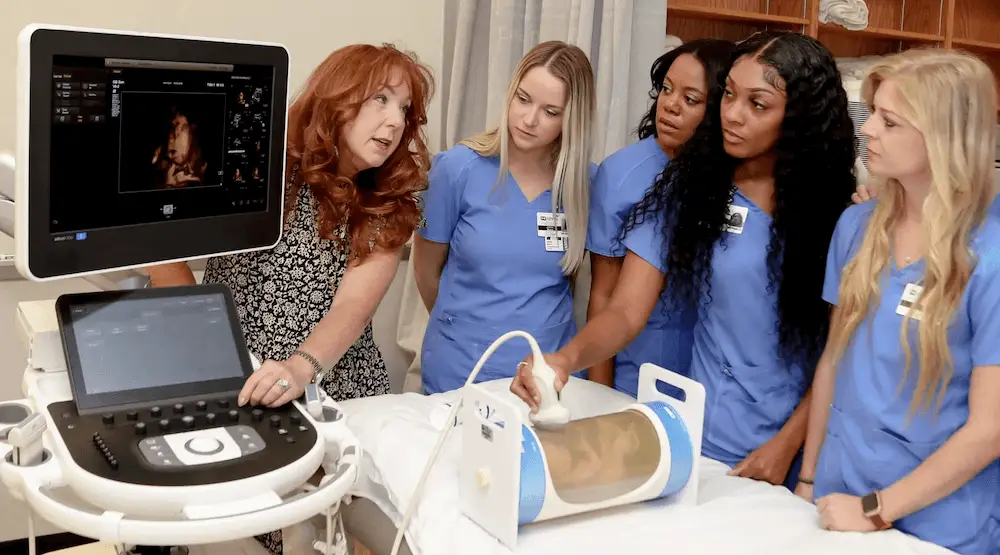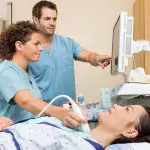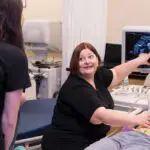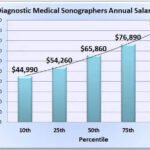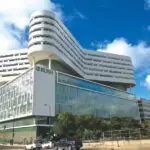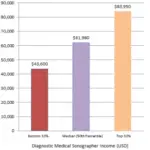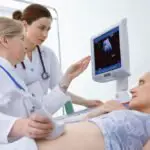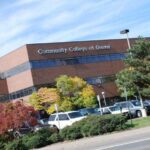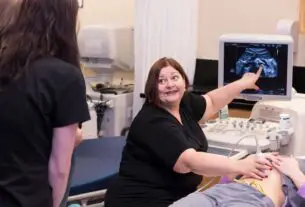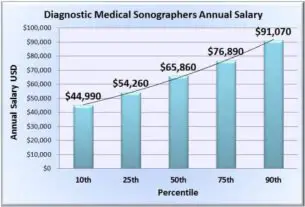Top 10 factors to consider while choosing Ultimate 5 Ultrasound Technician Programs in Chicago : Ignite Your Passion
When choosing ultrasound technician programs in Chicago Illinois, you’ll want to consider several factors to ensure that you receive quality education and training. Here are the top 10 factors to consider:
- Accreditation: Ensure that the ultrasound technician programs you’re considering are accredited by a recognized accrediting body, such as the Commission on Accreditation of Allied Health Education Programs (CAAHEP) or the Joint Review Committee on Education in Diagnostic Medical Sonography (JRC-DMS).
- Program Reputation: Research the reputation of the programs. Look for reviews, ratings, and alumni testimonials to gauge the program’s overall quality and success in producing skilled ultrasound technicians.
- Curriculum: Review the program’s curriculum to ensure it covers all the essential topics and clinical training required for becoming a competent ultrasound technician. Look for a well-rounded curriculum that includes classroom instruction and hands-on clinical experience.
- Faculty Qualifications: Investigate the qualifications and experience of the program’s faculty members. Experienced instructors can significantly impact the quality of your education.
- Clinical Training Opportunities: Ensure that the program offers ample clinical training opportunities. Practical experience is crucial for developing your skills, so consider the variety and quality of clinical sites available.
- Certification Exam Pass Rates: Find out the program’s pass rates for relevant certification exams, such as the American Registry for Diagnostic Medical Sonography (ARDMS) exams. High pass rates can indicate a strong curriculum and effective teaching.
- Class Sizes: Consider the student-to-faculty ratio and class sizes. Smaller class sizes often allow for more personalized instruction and interaction with faculty.
- Facilities and Equipment: Visit the program’s facilities and check the quality and availability of ultrasound machines and other equipment. Up-to-date technology is essential for practical training.
- Location and Commute: Evaluate the program’s location and your commute to ensure it’s convenient and manageable. Factor in transportation, parking, and potential housing options if necessary.
- Financial Aid and Scholarships: Look into the availability of financial aid, scholarships, or tuition assistance programs to help with the cost of your education. Explore your options for funding your ultrasound technician program.
Remember that personal preferences and priorities may vary, so it’s important to visit the programs, speak with current students and faculty, and gather as much information as possible to make an informed decision about which ultrasound technician programs in Chicago is the best fit for you.
Choosing the best Ultrasound Technician Programs in Chicago
Ultimate 5 Ultrasound Technician Programs in Chicago : Carefully choose your Best
- College of DuPage: Offers an associate degree program in diagnostic medical sonography. The program is designed to prepare students for entry-level positions in sonography. Students can earn an Associate in Applied Science degree in Diagnostic Medical Imaging Sonography that includes general and vascular training, as well as a certificate in ultrasound and vascular sonography. The program emphasizes the delivery of high-quality patient care correlated with the knowledge and skills needed to accurately diagnose pathologies. The Sonography program at College of DuPage is designed to prepare students for entry-level positions in sonography. Students can earn an Associate in Applied Science degree in Diagnostic Medical Imaging Sonography that includes general and vascular training, as well as a certificate in ultrasound and vascular sonography. The program is a selected enrollment program, and students need to qualify to apply for the program by completing prerequisite classes and other admissions requirements. The admission criteria and checklist are available in the Sonography Degree Admissions Packet.
- Triton College: Offers an associate degree program and a certificate program in diagnostic medical sonography. The program covers instruction in obstetric, abdominal, peripheral vascular, and small parts ultrasound. After completing the first year, students can complete an optional summer course in laboratory techniques. Triton College Chicago offers a Diagnostic Medical Sonography program that prepares students for entry-level positions in sonography. The program is designed to provide students with the necessary skills to perform general and vascular sonography. The admission criteria for the Diagnostic Medical Sonography program are available on the Triton College website.
- William Rainey Harper College: Offers an associate degree program in diagnostic medical sonography. The degree program prepares the graduate to secure their American Registry of Diagnostic Medical Sonography credentials and entry-level work in the abdomen and obstetrics/gynecology specialty areas. The graduate also receives instruction in vascular sonography.
- Benedictine University: Offers a bachelor’s degree program in medical sonography. The program prepares students to become entry-level sonographers by performing diagnostic sonography procedures and obtaining sonographic diagnostic images. Students receive competency-based clinical training at Northwestern Medicine’s state-of-the-art facilities, using the most advanced diagnostic equipment available.
- Northwestern Memorial Hospital: Offers a certificate program in diagnostic medical sonography. The NM School of Diagnostic Medical Sonography is dedicated to preparing students for the clinical, theoretical, and patient care aspects of a career in sonography through an integrated program of didactic and clinical instruction. Upon successful completion of program requirements, students are awarded a certificate of completion in Diagnostic Medical Sonography and are eligible to be certified through examination by the national certifying agency, American Registry for Diagnostic Medical Sonography.
William Rainey Harper College Ultrasound Technician Programs in Chicago
William Rainey Harper College is a community college located in Palatine, Illinois, which is a suburb of Chicago. It is one of the best Ultrasound Technician Schools in Illinois. The college offers various programs, including healthcare-related programs like ultrasound technician programs. Please note that program details, offerings, and other information may have changed since then, so it’s essential to check the college’s official website or contact them directly for the most up-to-date information. Here is a general description of what you might expect from an ultrasound technician program at Harper College:
- Ultrasound Technician Program Overview: William Rainey Harper College likely offers a comprehensive ultrasound technician program designed to prepare students for a career in diagnostic medical sonography. This program typically includes a combination of classroom instruction and clinical experience to provide students with the necessary knowledge and practical skills.
- Curriculum: The curriculum typically covers various aspects of medical sonography, including anatomy, physiology, patient care, and the operation of ultrasound equipment. Students may also study specialized areas such as abdominal, obstetric, gynecological, and vascular sonography.
- Clinical Training: Clinical training is a crucial component of an ultrasound technician program. Students will have the opportunity to gain hands-on experience by working with real patients in a clinical setting. This practical training helps students apply their knowledge and develop essential skills in performing ultrasound scans.
- Accreditation: It’s essential to ensure that the ultrasound technician program at William Rainey Harper College is accredited by the Commission on Accreditation of Allied Health Education Programs (CAAHEP) or the Joint Review Committee on Education in Diagnostic Medical Sonography (JRC-DMS). Accreditation ensures that the program meets established standards of quality and prepares students for certification exams.
- Certification: Upon completing the program, students may be eligible to sit for certification exams offered by organizations such as the American Registry for Diagnostic Medical Sonography (ARDMS) or the American Registry of Radiologic Technologists (ARRT). Certification is often required or preferred by employers and demonstrates competency in the field.
- Career Opportunities: Graduates of the ultrasound technician program can pursue careers as diagnostic medical sonographers, working in hospitals, clinics, imaging centers, or private practices. The demand for ultrasound technicians is generally high, and job prospects are favorable.
- Continuing Education: The field of medical sonography is continually evolving, so many ultrasound technicians choose to pursue continuing education and specialization to stay current in their careers.
Please keep in mind that program details, admission requirements, and tuition costs may have changed. It’s crucial to visit the official website of William Rainey Harper College Ultrasound Technician Programs in Chicago IL or contact their admissions office for the most accurate and current information regarding their ultrasound technician programs in Chicago.
Benedictine University Ultrasound Technician Program in Chicago
Benedictine University is a Catholic university located in Lisle, Illinois, United States. The university offers a Diagnostic Medical Sonography program that trains students to use high-frequency sound waves (ultrasound) to produce dynamic visual images of organs, tissues, and blood flow inside the body. The program aims to prepare students to perform diagnostic sonography procedures and obtain sonographic diagnostic images. Students learn to use independent judgment in recognizing the need to extend the scope of a procedure according to diagnostic findings
